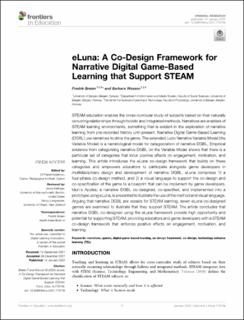eLuna: A co-design framework for narrative digital game-based learning that support STEAM
Journal article, Peer reviewed
Published version

View/
Date
2022Metadata
Show full item recordCollections
Abstract
STEAM education enables the cross-curricular study of subjects based on their naturally occurring relationships through holistic and integrated methods. Narratives are enablers of STEAM learning environments, something that is evident in the exploration of narrative learning from pre-recorded history until present. Narrative Digital Game-Based Learning (DGBL) use narratives to drive the game. The extended Ludo Narrative Variable Model (the Variable Model) is a narratological model for categorization of narrative DGBL. Empirical evidence from categorizing narrative DGBL on the Variable Model shows that there is a particular set of categories that incur positive effects on engagement, motivation, and learning. This article introduces the eLuna co-design framework that builds on these categories and empowers educators to participate alongside game developers in multidisciplinary design and development of narrative DGBL. eLuna comprises 1) a four-phase co-design method, and 2) a visual language to support the co-design and co-specification of the game to a blueprint that can be implement by game developers. Idun’s Apples, a narrative DGBL co-designed, co-specified, and implemented into a prototype using eLuna, is presented to illustrate the use of the method and visual language. Arguing that narrative DGBL are vessels for STEAM learning, seven eLuna co-designed games are examined to illustrate that they support STEAM. The article concludes that narrative DGBL co-designed using the eLuna framework provide high opportunity and potential for supporting STEAM, providing educators and game developers with a STEAM co-design framework that enforces positive effects on engagement, motivation, and learning.
